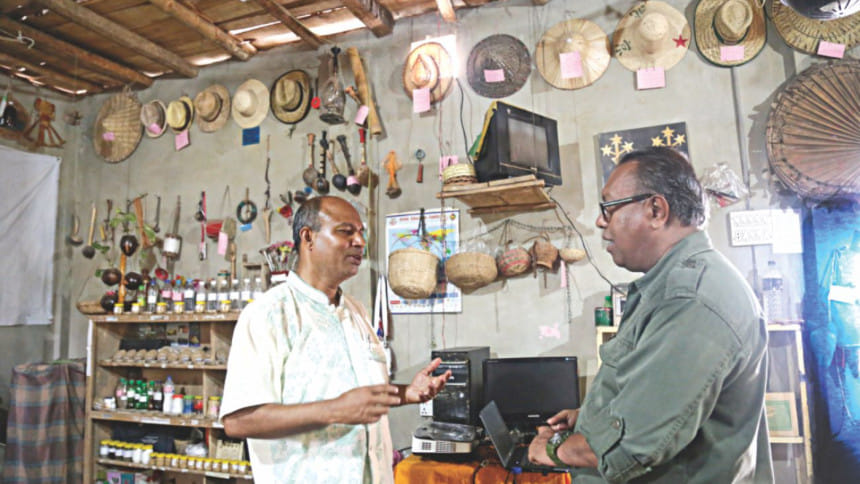A hub of knowledge for farmers

Shykh Seraj is a Media and Agriculture Development Activist. He is an Ashoka Fellow and recipient of Ekushey Padak, FAO A.H. Boerma Award and many other prestigious accolades. At Channel i, he is Director and Head of News. He is also Director and Host of the popular agro-documentary, “Hridoye Mati O Manush”.
For the past nine years, I have been observing the activities of a welfare oriented institution at a remote village. Every day something new is being added there. Its surrounding is getting covered with greenery. Inside, various agricultural tools are being added. Through a wide-range plan, sacrifice and dream, a dreamer named Shah Alam Jahangir is taking this institution forward. I am talking about Shah Agricultural Information Library and Museum at Kaligram in Manda upazila of Naogaon.
After its establishment in 2008, I went to see this initiative for the first time in 2009. Now, it has expanded its scope a lot. There is no commercial purpose here. Shah Jahangir, an assistant teacher of Rajshahi Collegiate School, is working on his own out of passion. Whatever help he is getting from here and there, he uses it for this institution. People of all ages can come here and dream for something more. For those who spend their whole day with the soil and crops, this is a sanctuary. Similarly, the children of Kaligram and nearby areas love to come here to get the touch of soil. It has a different kind of school for farmers' kids. Many children are also learning alphabets and getting tips on primary education from Shah Jahangir.
Farmers' kids have laid a mat on the ground to sit and study. You won't find such an amusing school anywhere else in this age. There is opportunity to study there with utmost attention. These kids are being raised by the love of the soil. We have talked to the school teacher, Abdul Karim Pramanik.
"The time I spend with the kids is the richest part of my life," says Pramanik.
There is a crop calendar on a wall of the open school. It contains various items of information. Besides kids, farmers are getting enriched and aware. The whole house is full of rural and agricultural tools and technologies, which is regarded as the museum. There is also a seminar room in the museum. Over there, farmers discuss and share their problems to get a better solution. The interactivity is lively and very much effective.
What is not there in Shah Jahangir's museum? On the walls, there is a row of mathals (farming hats) of different models collected from different regions of the country. Various kinds of agricultural equipment like the toll for rope knitting, mango collecting, fish catching, etc are kept here. There are rare books on farmers' health, education and agriculture in the library section. To be noted, Shah Jahangir's ancestral home has been turned into a museum.
At the seminar room, I have seen some farmers watching a video with great interest. This is a regular scene here. Everyday farmers from faraway places come here to learn something new. They come out of curiosity. Some come for their own needs. There are DVDs of various agro-documentaries of both home and abroad. I have seen DVDs of Hridoye Mati O Manush there too. After the evening, those are shown on the big screen to the farmers as farming awareness tool.
I was thinking about International Rice Research Institute's Rice Museum in Los Banos, Philippines. I went there back in 2004. As an international institution, it is not that hard to make such a museum. However, in a rural village, it is a huge thing to make such a museum with rare and traditional agro-equipment.
This library started its journey on April 18, 2008. Jahangir is expanding its scope and activities, like an original and creative work. Already, the reputation of this place is spreading worldwide. Shah Jahangir has also made a website of Shah Agricultural Information Library and Museum.
Shah Jahangir is a dreamer. He is a son of a well-off farmer family. For the sake of protecting his ancestral agriculture heritage, he started building this library as well as the museum. However, its prospect has extended greatly now. He is thinking about all agricultural issues. Thus, he is trying to do something about the agricultural community as a whole.
Guests from different countries including Japan, India, USA and Canada have visited Shah Jahangir's library and museum. Students from across the country have also visited the place with keen interest for knowledge.
Dear readers, Bangladesh is a country of agricultural heritage. Today, knowledge science and information communication has brought a new balance among people. However, proper knowledge is not being available to the grassroots people equally. We cannot do away with agriculture. It is sad that an agricultural museum is yet to be nationally established in our country. Establishing libraries for farmers is needed to help them study and practise modern farming techniques. In this case, the initiative Shah Jahangir is taking forward step by step is a foundation of our future. To carry this initiative forward, government and private assistance is required. Following the example of Shah Agricultural Information Library and Museum, it is necessary to establish such libraries and museums in different places of the country. It will help people of all professions to learn and concentrate more on farming sector. At the same time, I believe it will play a pivotal role in providing current and latest agricultural information to the farmers and eventually Bangladesh will harvest the best out of it.

 For all latest news, follow The Daily Star's Google News channel.
For all latest news, follow The Daily Star's Google News channel. 



Comments